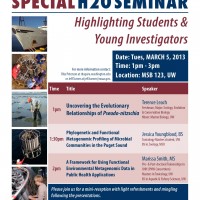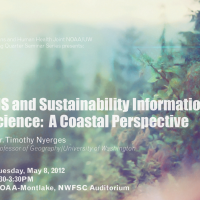Bryanda Wippel’s first marine biology course at the University of Washington sparked her desire to major in Environmental Studies and minor in Marine Biology as well as Aquatic and Fishery Science. Now, a senior at the UW, Bryanda has completed her Undergraduate Senior Capstone Project: Indirect Climate Change Impacts on Fishery Species in the California Current.
Spending a summer with The Northwest Fisheries Science Center of NOAA, Bryanda initiated the internship reassessing the diet database of marine species inhabiting the California current. With that information, Wippel then researched economic loss potential due to the impact of ocean acidification on diets of marine species, practically those popular among fisheries.
Supported by the PoE Student Success Fund, College of the Environment Student Meeting Fund, site advisors at NOAA, and faculty adviser, Bryanda Wippel’s summer internship concluded in San Diego, where she presented here work at the 2013 California Cooperative Oceanic Fisheries Investigations Conference.

The College of the Environment and the Program on the Environment realize the ways in which experiences, such as Bryanda Wippel’s Capstone, can accelerate the career of students. Awards are granted to support student learning and professional development.

